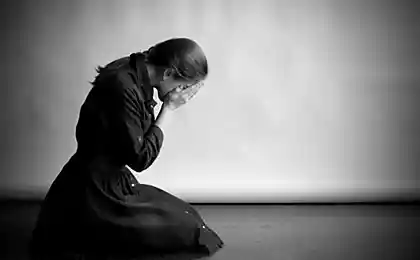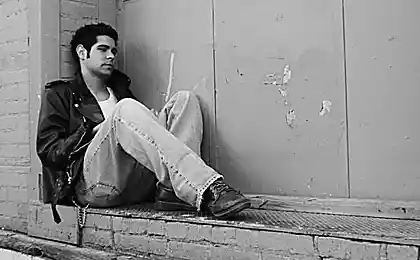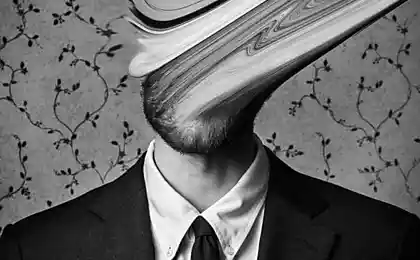491
As sadness turns into depression
What if humanity is to take away the ability to be sad and mourn? All the rest is anger and aggression, anxiety and fear, joy, any other experiences people will have exactly the same abilities, only to be upset is not capable in principle.
A world without anguish, without sorrow, without depression. In which a person is able to experience pain and suffering who can evaluate the trouble and trouble, but not able for this reason to get upset.
Sudden death of loved ones, family breakdown, terminal illness and disabilities, job loss, collapse of plans, failed personal life — well, all this is not good, but it's just an external problem that should be addressed, or they do not recognize, and decide to forget, nothing personal, just rational responses to cognitive machines inside the head.
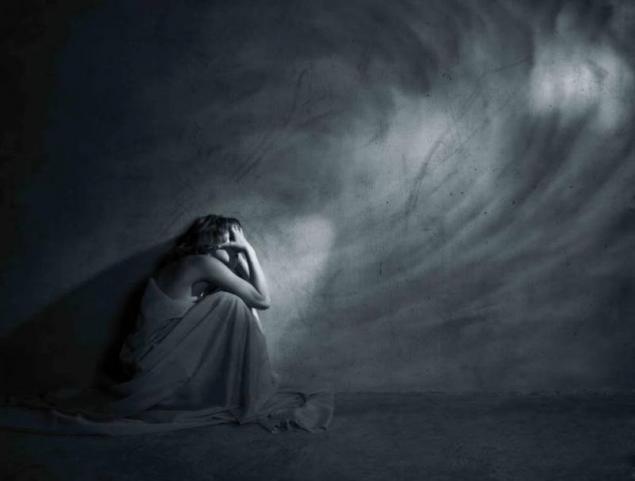
The ability not to feel useless and impractical emotions is a very valuable skill, I advise everyone to buy it.
However, in practice, the overwhelming majority of its human psyche does not. People get upset, sad, mourn, grieve, experience depression, decline and depression. And, apparently, it "zhzhzhzh" for a reason.
Which brings us to the question: why? What biological significance and evolutionary advantage?
To get close to a probable answer to this question, let's start from afar. There is such a famous role-playing game about a plane crash in the desert. Often run both in experiments and in a variety of training programs. Exists in many varieties, the General idea is this:
you group was on a plane, the plane crashed in the middle of the Sahara, you miraculously escaped. Around the pieces of crumpled metal and sand dunes to the horizon in all directions. You are in the remains of the plane found a little bit of Breakfast cereal, packets of juice and water (enough for 7 days max) plus a set of objects (here follows a list of more or less typical for any Robinson Crusoe). Day +45, at +5.
You're you, ordinary people, without special training. Your actions?
There is usually starts a lively discussion in the group, all active shared objects, arguing over leadership, planning transition across the desert and generally demonstrate rapid activity and a willingness to take decisive action.
Human nature does not allow him to sit idly by in the face of mortal threats.
Although in this situation the only correct decision — to do nothing. To lie down, to calm down and prepare to die. Because you still can not come, no chance. In the desert after 3 days you run out of water after 4 days you will die.
The most rational solution is to dig a hole under the wing, lie down and try to stretch the supply of fluid to the maximum. Then the water will be over in a week and a few days later you will die. But this time, maybe you'll find. Or not find. In any case, the situation is not up to you, do anything you can't, any active behavior will only aggravate your condition: what you can do is to do nothing, to accept and wait.
History from another region — learned helplessness. In popular psychological literature on learned helplessness is always stated in the negative and judgy context as "victim complex" as the cause of different psychological problems and disadaptative. And all this is largely true opinion, but we must not forget that at the heart of this are quite natural mechanisms.
Experimental models there are many, for humans and for animals. For example, a monkey in a cage serves a painful stimulus (say, a Zap). And show a way out of this painful situation, for example, the sequence of levers or keys on which the door to the cell opens and the monkey can escape into the next chamber, where the floor is not under tension. The animal quickly learns this and begins to successfully avoid painful stimuli.
And then the output block. Push do not push, what would you do, the door will not open, there is no escape. And current continue to beat. You can yell, you can climb on the wall, you still hurt, and there is no way to stop it. And the animal rolls up in a corner, refuses all behavioral activity and accepts his fate, only a small flinch when the next stroke. Further, even when the output appears again, if the monkey to show that the opportunity came to open the door and come out, she this opportunity does not use. She was accustomed to suffer, learn to endure and to persist. Since forming learned helplessness.
And here we get to the answer to the question — "and what man depression." Most emotions predispose us to certain behavioral decisions and search behavior or protection, attack or avoidance, etc., etc.
Depression, by contrast, involves the refusal behavior.
And it makes sense. What would we on the subject did not think that external circumstances do not always depend on us. There are troubles and problems, we still can't do anything, they just happen. Any active behavior is only harmful. The more fuss, the more deeply bogged down in a quagmire. If violence cannot be avoided, all that remains is to breathe and relax. With any illness or injury the natural state is to lie down and lie. "Cold, hunger and peace" — that in ancient times were treated.
Of course, people are irrational in their thoughts and actions, but the mechanisms of our psyche — they are quite biologically rational. Everyone under the skull — machine cognitive decision-making, it is functional and does nothing for nothing.
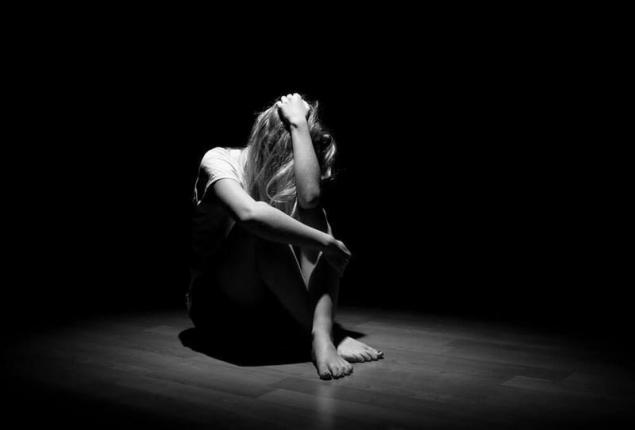
When we talk about the causes of depression, is not quite pertinent to focus solely on the stress. Stress is a very General concept, it does not necessarily evaluated negatively. And even when stress (mental or otherwise) is perceived as a negative situation, it is a challenge for us, is the reason for proactive behavior based on fear and anxiety, anger and aggression, on anything.
But when the brain interpreterpath the situation as non-productive decisions, when still there is no escape, the natural conclusion is to suppress the behavioral and mental activity. And to the subject not to rock the boat, to draw inside the head the appropriate emotion — melancholy, depression, sadness. So to speak, to slap on top of a granite slab to make sure. Thus is formed the classic "depressive triad":
"To forget, to die, to sleep. And know that this terminator of heartache and thousands of hardships."
Choose not to choose. Not to make decisions. Don't move. Any independent decisions erroneous. Any activity only exacerbates. You're helpless. Be patient.
Fallen is Babylon the great with its endless day.
And from this basic mechanics grow all leaf symptoms characteristic of depression.
Normally operating the psyche there is always some competition emotional States. Always and with all, there are different troubles making the person is in sadness, and that's fine. But long a person in anguish can not be located (and in any other mood), so after a while he gets mad, or scared, or calm, or happy, or whatever. And his mood will change. And will change again and again. If the adaptive mechanism breaks down for any reason, the brain goes into a self-sustaining cycle, the longing does not go off, and psyche falls into depressive disorder.
The thesis which I sounded repeatedly, and will say it again: any emotional state of themselves neither good nor bad. It's just a set of functional and evolutionary useful mental tools. Any of these tools, out-of-control, it means for a person in big trouble.
The sadness we subjectively unpleasant, but it is adaptive, so the sadness is not bad, it's fine.
Depression we also subjectively unpleasant, but it is not adaptive, and therefore it is bad.
There is a standard set of diagnostic criteria by which we can formally identify — have depressive disorder or not. The criteria are slightly different in the international and U.S. classifications, but not essential. In any case — there are large and small criteria. At the ICB must receive at least 2 out of 3 large plus 3 of the 6 small.
Large criteria is:
Constantly depressed mood 2 weeks or more (that is actually the experience of melancholy and grief which lasts long enough to be able to talk about the formation of stable pathological cycle).
— Anhedonia — loss of interest and enjoyment in life (i.e. a marked drop in the reward system when the standard Ricordi-promotion no longer works and Christmas toys kind of are the same, but not encouraging).
— Fatigue - severe fatigue, weakness and "fatigue" (the brain by the above mechanism suppresses any behavioral activity that is subjectively expressed in painful weakness and fatigue in somatically quite healthy and physically strong body).
Small criteria is:
An eating disorder can be in the direction of overeating and loss of appetite. This happens due to the competitive struggle 2 trends. On the one hand, the psyche tries to rectify a sharp drop in the subjective rewards. And the simplest and most affordable hedonistic pleasure is food. Any food, but preferably, the most stupid and simple way of pressing the button the promotion in the brain. That is sweet — fatty — salty. Sweets, bakery and other fast food. To not care about the long term effects, do not care about appearance, to not care at all, in this state, a person is ready to do anything, just click on the promotion in the brain. Or you can have the intoxication of any nature, for the same purpose. So melancholy jam, longing to drink, it does not matter, the uniform mechanism.
That feeling when you cringed at the fading fire in the middle of the polar night, and frantically trying anything to revive the rapidly dying fire, and sword, there any flammable debris, because there is nothing left, and the source of subjective warmth and comfort to you all less, and the darkness and cold behind getting closer.
And you know what, in principle, already all. No options.
That's why depression and obesity this high comorbidity. There really understand who started it, the social consequences of obesity caused depression or depression caused the eating disorder, it does not matter, anyway, mind to beat on two fronts.
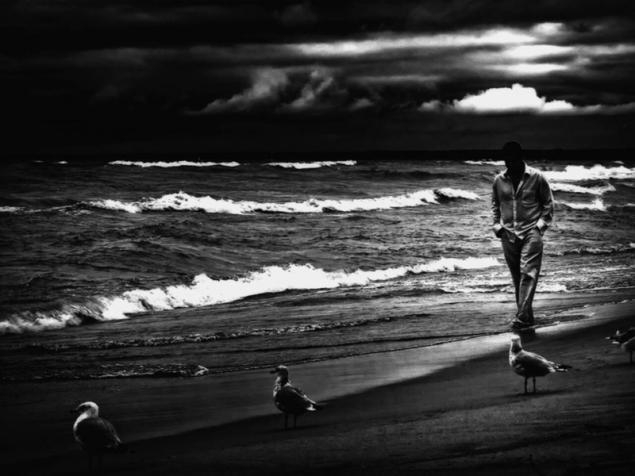
This situation is typical rather for mild or moderately severe depression. Because of the severity of the manifestations, all the more evident the overall depressed rate at the total suppression of all, the grim glacier of anhedonia finally rolled on all these flutter and the nature of food behavior changes to reduce appetite, and loss of hunger (as well as all other feelings and emotions that are different from the depressive spectrum, all that is called "painful sense of loss of feelings", it's "mournful loss of consciousness", it is the same depressive depersonalization, it is anaesthesia dolorosa psychica).
Any normal man loves himself. If you don't love yourself it means he's depressed. Remove the person from any bottom, any garbage, any brothel or prison. Ask how, in his opinion, he came to such a life. It will be a story about the plight and difficult circumstances, or will it be a story about the personal weaknesses and vices, but in any case — the person for his beloved, it is very good and wish myself all the best. It does not matter, we sympathize with this character or not, it can be a smelly bum, whose hands the life-propyl, or it could be a girl from a brothel, who was stolen and forced to remain. It does not matter. Under all the blows of fate healthy mind gets up and goes on. Depressive lies and lies, without even the blows of fate.
Hence the ideas of self-accusation. Thoughts of guilt, insignificance, helplessness, lack of prospects, lack of future — meaningful they can be what you want. No matter what you're guilty of, it is important that you are always guilty. There was a man, the article. Actually, this thoughts-it is difficult to call. This is one single thought. It is, rather, not even thought, is a cognitive construct that produces a broken machine of sadness. Metaphorically speaking, a by-product of the mental activity of the parasite.
About what a person will experience guilt and why exactly would feel helpless and worthless — it does not matter in the least. In this sense, the mind only picks up the workpiece and painted Khokhloma words and images from personal experience.
It's like the gas bubbles on the surface of the swamp. Methane bubble is born somewhere in the depths and rises to the surface. Our consciousness is only a thin film on the surface of the swamp, and what we see is a bubble of gas. But we can see we have no senses. We can only see the iridescence on the surface of the bubble. Our thoughts, our words and our images is just too much interference of light waves on the film surface tension, they can be any shape, it has no value.
Also interesting: On the other side of boredom, or ennui, as the return to yourself
The trend of illusion about women's happiness
The point being that all these ideas about self-blame, helplessness, of the futility of any effort, unbelief, self-confidence, low self esteem, painful thoughts that it is impossible to radically change their quality of life and so are merely manifestations of underlying emotional distress only on a higher level, in the form of words and reasoning.And the main trouble of this moment is that a depressed person sincerely believes in what he thinks and seriously believes that things actually are.published
The author is unknown.
P. S. And remember, only by changing their consumption — together we change the world! ©
Join us in Facebook , Vkontakte, Odnoklassniki
Source: ai-news.ru/2016/04/ochen_delnyj_tekst_o_depressii_554933.html
A world without anguish, without sorrow, without depression. In which a person is able to experience pain and suffering who can evaluate the trouble and trouble, but not able for this reason to get upset.
Sudden death of loved ones, family breakdown, terminal illness and disabilities, job loss, collapse of plans, failed personal life — well, all this is not good, but it's just an external problem that should be addressed, or they do not recognize, and decide to forget, nothing personal, just rational responses to cognitive machines inside the head.

The ability not to feel useless and impractical emotions is a very valuable skill, I advise everyone to buy it.
However, in practice, the overwhelming majority of its human psyche does not. People get upset, sad, mourn, grieve, experience depression, decline and depression. And, apparently, it "zhzhzhzh" for a reason.
Which brings us to the question: why? What biological significance and evolutionary advantage?
To get close to a probable answer to this question, let's start from afar. There is such a famous role-playing game about a plane crash in the desert. Often run both in experiments and in a variety of training programs. Exists in many varieties, the General idea is this:
you group was on a plane, the plane crashed in the middle of the Sahara, you miraculously escaped. Around the pieces of crumpled metal and sand dunes to the horizon in all directions. You are in the remains of the plane found a little bit of Breakfast cereal, packets of juice and water (enough for 7 days max) plus a set of objects (here follows a list of more or less typical for any Robinson Crusoe). Day +45, at +5.
You're you, ordinary people, without special training. Your actions?
There is usually starts a lively discussion in the group, all active shared objects, arguing over leadership, planning transition across the desert and generally demonstrate rapid activity and a willingness to take decisive action.
Human nature does not allow him to sit idly by in the face of mortal threats.
Although in this situation the only correct decision — to do nothing. To lie down, to calm down and prepare to die. Because you still can not come, no chance. In the desert after 3 days you run out of water after 4 days you will die.
The most rational solution is to dig a hole under the wing, lie down and try to stretch the supply of fluid to the maximum. Then the water will be over in a week and a few days later you will die. But this time, maybe you'll find. Or not find. In any case, the situation is not up to you, do anything you can't, any active behavior will only aggravate your condition: what you can do is to do nothing, to accept and wait.
History from another region — learned helplessness. In popular psychological literature on learned helplessness is always stated in the negative and judgy context as "victim complex" as the cause of different psychological problems and disadaptative. And all this is largely true opinion, but we must not forget that at the heart of this are quite natural mechanisms.
Experimental models there are many, for humans and for animals. For example, a monkey in a cage serves a painful stimulus (say, a Zap). And show a way out of this painful situation, for example, the sequence of levers or keys on which the door to the cell opens and the monkey can escape into the next chamber, where the floor is not under tension. The animal quickly learns this and begins to successfully avoid painful stimuli.
And then the output block. Push do not push, what would you do, the door will not open, there is no escape. And current continue to beat. You can yell, you can climb on the wall, you still hurt, and there is no way to stop it. And the animal rolls up in a corner, refuses all behavioral activity and accepts his fate, only a small flinch when the next stroke. Further, even when the output appears again, if the monkey to show that the opportunity came to open the door and come out, she this opportunity does not use. She was accustomed to suffer, learn to endure and to persist. Since forming learned helplessness.
And here we get to the answer to the question — "and what man depression." Most emotions predispose us to certain behavioral decisions and search behavior or protection, attack or avoidance, etc., etc.
Depression, by contrast, involves the refusal behavior.
And it makes sense. What would we on the subject did not think that external circumstances do not always depend on us. There are troubles and problems, we still can't do anything, they just happen. Any active behavior is only harmful. The more fuss, the more deeply bogged down in a quagmire. If violence cannot be avoided, all that remains is to breathe and relax. With any illness or injury the natural state is to lie down and lie. "Cold, hunger and peace" — that in ancient times were treated.
Of course, people are irrational in their thoughts and actions, but the mechanisms of our psyche — they are quite biologically rational. Everyone under the skull — machine cognitive decision-making, it is functional and does nothing for nothing.

When we talk about the causes of depression, is not quite pertinent to focus solely on the stress. Stress is a very General concept, it does not necessarily evaluated negatively. And even when stress (mental or otherwise) is perceived as a negative situation, it is a challenge for us, is the reason for proactive behavior based on fear and anxiety, anger and aggression, on anything.
But when the brain interpreterpath the situation as non-productive decisions, when still there is no escape, the natural conclusion is to suppress the behavioral and mental activity. And to the subject not to rock the boat, to draw inside the head the appropriate emotion — melancholy, depression, sadness. So to speak, to slap on top of a granite slab to make sure. Thus is formed the classic "depressive triad":
- motor inhibition,
- ideatornoy retardation,
- the vital longing.
"To forget, to die, to sleep. And know that this terminator of heartache and thousands of hardships."
Choose not to choose. Not to make decisions. Don't move. Any independent decisions erroneous. Any activity only exacerbates. You're helpless. Be patient.
Fallen is Babylon the great with its endless day.
And from this basic mechanics grow all leaf symptoms characteristic of depression.
Normally operating the psyche there is always some competition emotional States. Always and with all, there are different troubles making the person is in sadness, and that's fine. But long a person in anguish can not be located (and in any other mood), so after a while he gets mad, or scared, or calm, or happy, or whatever. And his mood will change. And will change again and again. If the adaptive mechanism breaks down for any reason, the brain goes into a self-sustaining cycle, the longing does not go off, and psyche falls into depressive disorder.
The thesis which I sounded repeatedly, and will say it again: any emotional state of themselves neither good nor bad. It's just a set of functional and evolutionary useful mental tools. Any of these tools, out-of-control, it means for a person in big trouble.
The sadness we subjectively unpleasant, but it is adaptive, so the sadness is not bad, it's fine.
Depression we also subjectively unpleasant, but it is not adaptive, and therefore it is bad.
There is a standard set of diagnostic criteria by which we can formally identify — have depressive disorder or not. The criteria are slightly different in the international and U.S. classifications, but not essential. In any case — there are large and small criteria. At the ICB must receive at least 2 out of 3 large plus 3 of the 6 small.
Large criteria is:
Constantly depressed mood 2 weeks or more (that is actually the experience of melancholy and grief which lasts long enough to be able to talk about the formation of stable pathological cycle).
— Anhedonia — loss of interest and enjoyment in life (i.e. a marked drop in the reward system when the standard Ricordi-promotion no longer works and Christmas toys kind of are the same, but not encouraging).
— Fatigue - severe fatigue, weakness and "fatigue" (the brain by the above mechanism suppresses any behavioral activity that is subjectively expressed in painful weakness and fatigue in somatically quite healthy and physically strong body).
Small criteria is:
- Feelings of guilt and helplessness.
- Lowered self-esteem.
- Pessimism.
- Suicidal thoughts.
- Sleep disorders.
- And loss of appetite.
An eating disorder can be in the direction of overeating and loss of appetite. This happens due to the competitive struggle 2 trends. On the one hand, the psyche tries to rectify a sharp drop in the subjective rewards. And the simplest and most affordable hedonistic pleasure is food. Any food, but preferably, the most stupid and simple way of pressing the button the promotion in the brain. That is sweet — fatty — salty. Sweets, bakery and other fast food. To not care about the long term effects, do not care about appearance, to not care at all, in this state, a person is ready to do anything, just click on the promotion in the brain. Or you can have the intoxication of any nature, for the same purpose. So melancholy jam, longing to drink, it does not matter, the uniform mechanism.
That feeling when you cringed at the fading fire in the middle of the polar night, and frantically trying anything to revive the rapidly dying fire, and sword, there any flammable debris, because there is nothing left, and the source of subjective warmth and comfort to you all less, and the darkness and cold behind getting closer.
And you know what, in principle, already all. No options.
That's why depression and obesity this high comorbidity. There really understand who started it, the social consequences of obesity caused depression or depression caused the eating disorder, it does not matter, anyway, mind to beat on two fronts.

This situation is typical rather for mild or moderately severe depression. Because of the severity of the manifestations, all the more evident the overall depressed rate at the total suppression of all, the grim glacier of anhedonia finally rolled on all these flutter and the nature of food behavior changes to reduce appetite, and loss of hunger (as well as all other feelings and emotions that are different from the depressive spectrum, all that is called "painful sense of loss of feelings", it's "mournful loss of consciousness", it is the same depressive depersonalization, it is anaesthesia dolorosa psychica).
Any normal man loves himself. If you don't love yourself it means he's depressed. Remove the person from any bottom, any garbage, any brothel or prison. Ask how, in his opinion, he came to such a life. It will be a story about the plight and difficult circumstances, or will it be a story about the personal weaknesses and vices, but in any case — the person for his beloved, it is very good and wish myself all the best. It does not matter, we sympathize with this character or not, it can be a smelly bum, whose hands the life-propyl, or it could be a girl from a brothel, who was stolen and forced to remain. It does not matter. Under all the blows of fate healthy mind gets up and goes on. Depressive lies and lies, without even the blows of fate.
Hence the ideas of self-accusation. Thoughts of guilt, insignificance, helplessness, lack of prospects, lack of future — meaningful they can be what you want. No matter what you're guilty of, it is important that you are always guilty. There was a man, the article. Actually, this thoughts-it is difficult to call. This is one single thought. It is, rather, not even thought, is a cognitive construct that produces a broken machine of sadness. Metaphorically speaking, a by-product of the mental activity of the parasite.
About what a person will experience guilt and why exactly would feel helpless and worthless — it does not matter in the least. In this sense, the mind only picks up the workpiece and painted Khokhloma words and images from personal experience.
It's like the gas bubbles on the surface of the swamp. Methane bubble is born somewhere in the depths and rises to the surface. Our consciousness is only a thin film on the surface of the swamp, and what we see is a bubble of gas. But we can see we have no senses. We can only see the iridescence on the surface of the bubble. Our thoughts, our words and our images is just too much interference of light waves on the film surface tension, they can be any shape, it has no value.
Also interesting: On the other side of boredom, or ennui, as the return to yourself
The trend of illusion about women's happiness
The point being that all these ideas about self-blame, helplessness, of the futility of any effort, unbelief, self-confidence, low self esteem, painful thoughts that it is impossible to radically change their quality of life and so are merely manifestations of underlying emotional distress only on a higher level, in the form of words and reasoning.And the main trouble of this moment is that a depressed person sincerely believes in what he thinks and seriously believes that things actually are.published
The author is unknown.
P. S. And remember, only by changing their consumption — together we change the world! ©
Join us in Facebook , Vkontakte, Odnoklassniki
Source: ai-news.ru/2016/04/ochen_delnyj_tekst_o_depressii_554933.html
Scandalous discovery: scientists 40 years hid the results of the study
Mom didn't understand anything...






